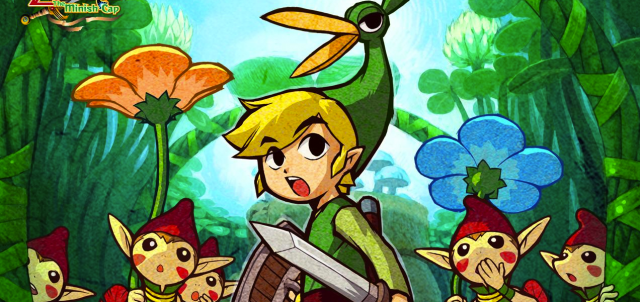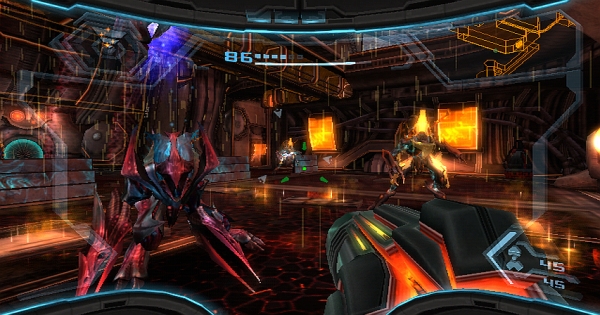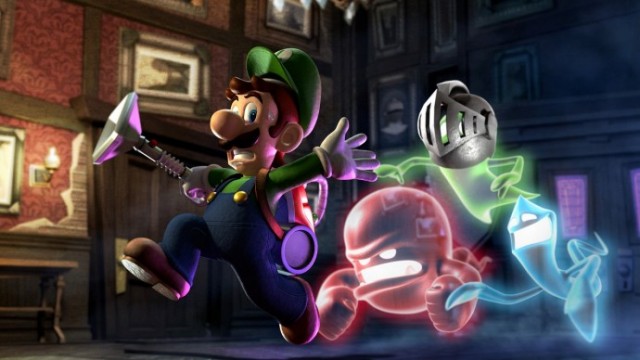
Game Boy Advance was home to only one original Zelda title, but despite being a franchise that Nintendo holds near and dear to its heart, development duties for The Legend of Zelda: The Minish Cap were left in the hands of fellow Japanese game maker Capcom, instead. Capcom was no stranger to the series by the time it began laboring away at Minish Cap. The developer had already created and released The Legend of Zelda: Oracle of Ages and Seasons for Game Boy Color four years prior in 2001. Capcom’s first two Zelda efforts (which were actually intended to be part of an interlocking trilogy, which sadly didn’t happen) were a rousing critical success, easily mimicking the quality of Nintendo’s own previous endeavors with the series. As good as those two games were, however, they paled in comparison to what Capcom achieved with Minish Cap.
We’ve talked at length in the past about Minish Cap from a gameplay perspective, so I wanted to touch on something a little different this time. Nintendo has been talking a lot lately about teaming up with other developers to create spinoffs and different types of games utilizing its various franchises. Fans have already seen the fruits of those labors when Hyrule Warriors released in the fall of last year. While not a masterstroke of genius by any means, it was nevertheless a fun and unique look at the world of Zelda through the lens of the development team behind the Dynasty Warriors series. While I applaud Nintendo’s initiative, and the sheer thrill to be had mashing up the company’s various properties with a myriad of different game genres and types of gameplay, I can’t help but wonder if Nintendo should be going the Minish Cap route more, instead.

I say this acknowledging that I don’t know for sure if it’s going to be any good, but Star Wars: The Force Awakens feels like it’s going to be a solid movie specifically because series creator George Lucas is not involved with its production. I’m not enough of a Star Wars fan to know what the diehards have to say about J.J. Abrams taking over director duties for the upcoming seventh film, but my sense is that having someone who was a fan of the original movies being put in charge opens up a whole gaggle of possibilities that would potentially never have been thought of if Lucas was still calling the shots. Having both a fresh perspective and the unbridled passion of someone who grew up loving the source material has the possibility of resulting in a final product that might even be superior to what the original creator could have made, given the chance.
Minish Cap was like The Force Awakens of the Zelda universe. A bunch of Capcom developers who grew up playing Zelda got together and did all the things with the series that they could only dream of as kids. Link got new weapons and items, conventions were played with, but it all came together and felt unmistakably “Zelda” in the end. It was brilliant. Brilliant because, whether intentionally or not, Nintendo reinvigorated the franchise by letting an outsider, letting Capcom play with it. Not that Zelda has ever found itself languishing, of course; after all, Wind Waker had already come out prior to Minish Cap and wreaked havoc with fan expectations. Yet there’s no denying that Minish Cap has qualities to it that are distinct amongst its Zelda brethren (or should that be sistren?), and even went on to influence Nintendo’s own future development of the series– look no further than Skyward Sword to see what I mean.
Minish Cap isn’t the only time fans have seen the benefits that an outside perspective can yield for Nintendo’s franchises. Rare’s work on Donkey Kong Country completely revitalized that character for generations to come. The same with Retro and its reinvention of the Metroid series with Metroid Prime. I said that the Zelda series has never languished, but arguably the majority of Nintendo’s numerous properties haven’t, either; dry spells of inactivity, yes, but outright sucking, well that generally just doesn’t happen. Still, it’s clear that as masterful as Nintendo is at tending to its own backyard, it doesn’t hurt if the company lets someone else take a whack at the hedges every once in a while. With decades of history under its belt, Nintendo has inspired countless players over the years, some of whom have gone on to make major waves in the video game industry as developers, themselves. Perhaps it would be to the benefit of all to let them play in the sandbox.

It’s important to be cautious, of course. Metroid: Other M showed everyone how badly things can go when third parties become involved in development (though in fairness, Nintendo itself bears the bulk of the blame for that train wreck). Despite any potential negatives, though, I think that everyone would profit from seeing Nintendo allow other developers to work on proper installments or reinventions of its marquee franchises. For one, it frees Nintendo up to create even more new properties like Splatoon or Code Name S.T.E.A.M. For another, Nintendo is always very hands-on with anything that comes out touting the name of one of its series; it’s not as though someone like Konami would just show up and get the keys to the kingdom and run around unchecked. Fans would be getting something unique to play that has been scrutinized by Nintendo itself, so the likelihood of buying outright junk (Other M notwithstanding) would be pretty low. The advantage being, besides fun games to play, getting those fun games at a faster rate. I’m not talking annual releases, clearly, but rather than wait five to six years for a new Zelda, fans might only have to wring their hands for two to three years, instead.
Minish Cap, Metroid Prime, F-Zero GX, Luigi’s Mansion: Dark Moon, if all those games prove anything, it’s evident that Nintendo can bring out the best in other developers. So give fans more of it. Let the people who have spent their whole lives thinking of ways to spice up Super Mario or Advance Wars have a moment to shine by doing exactly that. The tastes that players have gotten over the years have created some of the biggest hits and/or most revered entries that some of Nintendo’s series have ever seen. The risks can be high, but the payoff really does outweigh them. Capcom proved that it could keep pace with Nintendo when it made Minish Cap, so let’s see who else can walk the walk with the Big N.




 ShareThis
ShareThis






